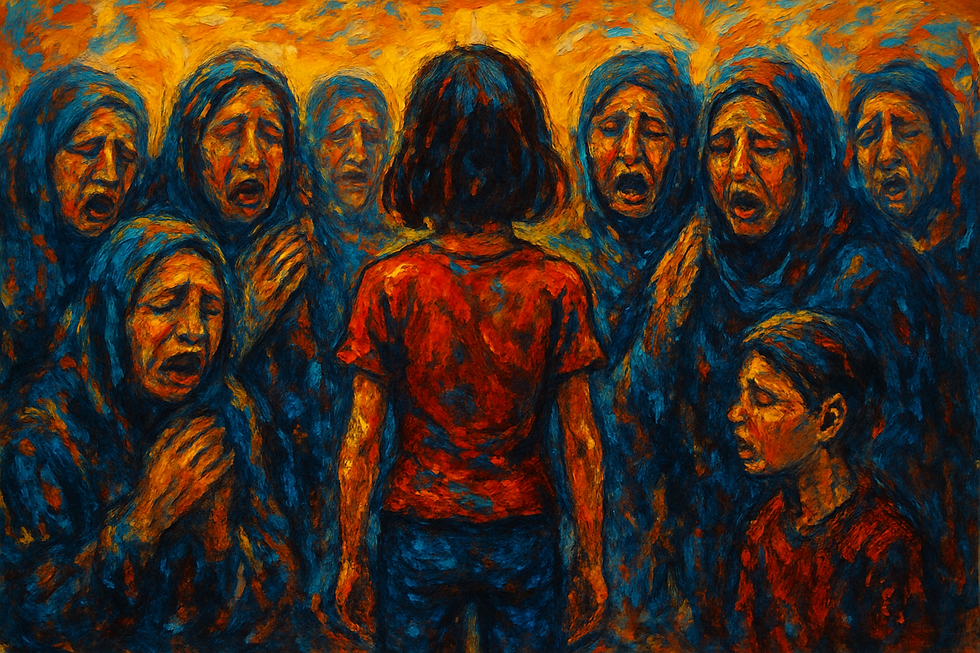Why Do These Issues Matter? A Journey Toward a Fairer World
- Asawar Al-Ablaq
- Oct 9, 2025
- 4 min read
By Asawar Al-Ablaq

I’ve often wondered why the world’s problems seem like an endless maze. When we think about climate change, fear grips us; when we hear about migration, our anxiety deepens. Yet upon reflection, it becomes clear that these issues are not isolated, they are interwoven threads in a single fabric that shapes our world and challenges us to rethink what social justice truly means. To ignore this interconnection is not simply an intellectual failure, but a moral one.
Climate and Migration: The Unfolding Tale of Justice
Have we ever asked ourselves why certain places suffer more than others from climate change? It’s not mere misfortune. More often than not, it’s the poorest communities , frequently ethnic or social minorities , that pay the highest price. They are not the ones polluting the planet, yet they face droughts and floods that destroy their homes and livelihoods. This is not just an environmental crisis; it’s a crisis of justice. Who causes the harm, and who bears the consequences?
When these people are forced to leave, their migration becomes a second ordeal. Women, in particular, face double the burden: violence, discrimination, and exploitation. Migration, then, is not just a physical displacement but a relentless struggle for survival , a test of our global ethics and humanity. Both our hearts and our policies must learn to act with greater compassion. Migration cannot be understood apart from climate justice, economic inequality, and human dignity.
Memory and Freedom of Expression: Voices That Cannot Be Silenced
When we speak of women’s rights or minority rights, we are not merely calling for progress , we are demanding recognition of histories that have long been silenced or distorted. Reclaiming collective memory is not about vengeance, but about learning, healing, and ensuring that injustice is never repeated. Historical marginalization doesn’t just erase the past; it shapes how we perceive the present. To remember is an act of resistance.
Freedom of expression, in this context, is not a luxury. It is a weapon against silence and complicity.
It allows us to expose injustice, amplify the voices of the broken, and demand accountability. But this freedom remains under siege , those who dare to speak truth to power are often muted, not with chains but through algorithms, censorship, and professional exclusion. Freedom of expression is not merely the right to speak; it is the capacity to think critically in a world that rewards conformity.
Politics: More Than a Game of Power
Politics may seem dull or distant, yet it remains the arena where decisions that define our lives are made. When women and minorities are excluded from these processes, justice becomes selective, and democracy turns performative. Politics should not be reduced to a contest of power, but rather seen as the moral and practical stage on which equality and representation are tested.
Women’s rights, climate change, migration, memory, and free expression , all of these are not separate agendas but branches of the same tree: social justice. Justice is not a slogan; it is an ongoing journey toward a world where every person , regardless of gender, ethnicity, or color , can live with dignity and security. These are not simply topics for essays; they are lived realities, and they demand our engagement, not our apathy.
The Audience: Between Manufactured Awareness and Designed Deception
Perhaps the most insidious illusion is that people believe they are part of the conversation, while in truth they are consumers of prepackaged narratives. The public repeats what the media and political discourse feed them, mistaking repetition for reasoning. This deception breeds a long-term immunity to truth itself. What masquerades as freedom of thought is, in fact, a meticulously designed form of control , an echo chamber disguised as diversity.
Polished Language, Hollow Meaning
Our political vocabulary gleams with phrases like “stability,” “national interest,” and “constructive dialogue.” Words that sparkle like freshly minted coins but carry no real value. They are linguistic traps , crafted not to enlighten thought, but to contain it. Small lies become everyday language; illusions transform into the grammar of public life. What begins as a subtle agreement between a host, a guest, and a channel owner evolves into an accepted “truth,” reproduced endlessly across cafés, workplaces, and social media feeds.
Authoritarianism Disguised as Freedom
The most dangerous form of oppression today does not come with guns or prisons , it comes dressed in the language of freedom. A globalized, meticulously timed censorship hides behind slogans like “balance of views” or “time management,” turning journalism into a polite execution of dissent. Freedom of expression becomes a commodity, and the public pays for it twice: once with its awareness, and again with its trust.
Conclusion: Social Justice as a Measure of Humanity
Ultimately, all these issues converge in one demand , social justice. To speak of it is not enough; it must be practiced, fought for, and protected. We must hold our institutions accountable, amplify marginalized voices, and ensure that justice is not conditional on privilege. Social justice is not an ideal to admire from afar, but a living test of whether our world remains human in the face of crisis , from climate disaster to migration, from silenced memories to stolen speech.
These are the issues that ignite my passion. They are not abstract causes but lived truths , a call to action for anyone who believes that change begins with awareness. Each story, each voice, is a step toward a fairer world , one where no voice is silenced, and no dignity is negotiable.
Asawar Al-Ablaq – a writer who explores the echoes of unheard voices through her words. Her work delves into collective memory, social justice, and the rights of the marginalized, women, minorities, and migrants alike.
The opinions expressed in this article are solely the author’s and do not represent the views of Nisaba Media.





Comments